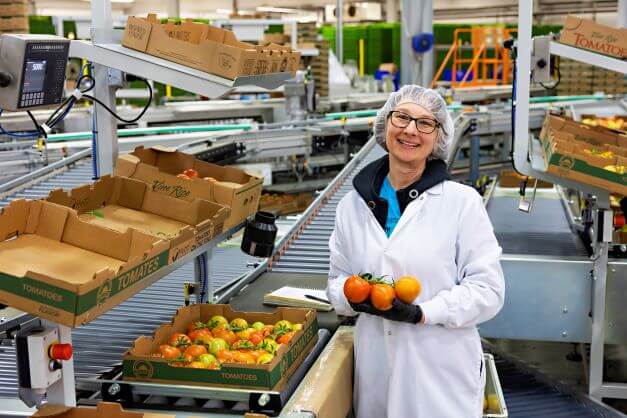When Russian troops moved into the Crimean Peninsula in 2014, Nataliia Buina and her family began looking for a safe country they could move to. They settled on Canada, applying for study permits for Buina’s husband and their two children. Buina herself was accepted into the agricultural stream of the federal Temporary Foreign Worker (TFW) program and in August 2017, began working at Truly Green Farms in Chatham.
With only limited English, she started as a packer at the tomato greenhouse and began taking courses at a local language centre. Today, she’s responsible for quality control before produce shipments leave the farm and is working on advanced level language training. And a year ago, the family gained permanent residency in Canada.
“I came to Canada as a temporary worker, and last year we got permanent residency and bought a house,” she says. “I love Chatham, I love Canada and the people are so friendly and nice.”
Felena Pereira also came to Canada to work in the fruit and vegetable industry, finding a job at Schuyler Farms in Norfolk County through the Seasonal Agricultural Worker Program (SAWP). At the end of every growing season, she would go home to her children in Trinidad and Tobago, but she loved Canada so much, she wanted to move here permanently.
“I hope someday to immigrate here with my family. That’s my intention,” she says. “I want my kids to grow up to have the opportunity to do anything they want to do. That’s why I’m here.”
Earlier this year, with the help of her employer who sponsored her, that dream became a reality when she received her permanent residency status.
Foreign labour programs for agriculture are often criticized as not offering participants the option of staying in Canada permanently, but the country’s doors are definitely open to those migrant workers, notes Stefan Larrass, senior policy advisor with the Ontario Fruit and Vegetable Growers’ Association.
“You have to meet certain conditions set by the federal government, but if you want to come, you have opportunities to do so either through provincial or federal immigration programs,” Larrass explains, adding the OFVGA has actively supported employers with interested TFWs in navigating the application process.
Year-round migrant workers can apply for permanent residency through a national pilot program provided they have at least one year of non-seasonal, full-time work experience in Canada.
And both seasonal and year-round workers can apply for permanent residency through the Ontario Immigrant Nominee Program if they have up to nine months of work experience in Ontario in the last three years.
Through both avenues, government rules stipulate workers need an offer of a permanent, year-round job, demonstrate English or French language skills and have a high school education or equivalent.
Regardless of whether a migrant worker pursues permanent residency, federal and provincial laws and regulations are in place to ensure all workers legally employed in Canada have the same workplace protections as Canadian employees doing the same work.
This includes frequent federal, provincial and foreign government employer compliance inspections and a multilingual, 24-7 federal government support line workers can use to raise concerns and seek help relating to their current employment.
Not all migrant farm workers want to move to Canada permanently; they look forward to returning to their families, jobs and businesses when the season is over.
For more than 20 years, Desrine Blair has had a seasonal job on a Niagara region peach farm and when she returns home to Jamaica, she focuses on her own business.
“I like to cook and, back home, I have a restaurant called Dimples Restaurant. We serve a lot of things, like pork, rice and peas, steamed fish with crackers and more,” she says.
Efrain Romero Tellez also has a business at home he runs when he’s not working on a Niagara region vineyard. For the last six years, he’s been coming to Canada from Mexico and, three years ago, he decided to start his own business selling fruits and vegetables.
“That is what I do now when I am not here, and I am back in Mexico. The business is closed when I’m here and when I return home, we restart it,” he explains.
To learn more about migrant farm workers in Canada and read their stories, visit www.morethanamigrantworker.ca.

